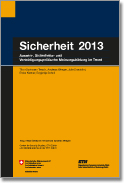Sicherheit 2013

The Trend of Opinions on Foreign, Security, and Defense Policy
Author(s): Tibor Szvircsev Tresch, Andreas Wenger, Julie Craviolini, Elvira Krämer, Evgjenije Sokoli
Editor(s): Tibor Szvircsev Tresch, Andreas Wenger
Series: Sicherheit
Publisher(s): Center for Security Studies (CSS), ETH Zürich; Militärakademie an der ETH Zürich
Publication Year: 2013
